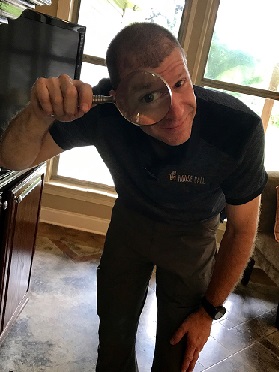I hope that everyone is having a wonderful day! Today I would like to touch on a subject that is near and dear to to hearts of business people everywhere: lessening liability in our businesses. I recently spent an arduous five hours in a state board of home inspectors meeting, listening while an inspector was “raked over the coals” for a substandard inspection that he had performed for a client. In our state, there is a complaint process written into the law whereby a client can lodge an official complaint with the state board against an inspector, provided that the client lists the specific laws (standards) that the licensed inspector has violated.

In this particular instance, even though he had been licensed for five years, the inspector was not very experienced. While sitting there, the board and the complainant pouring over his sparse report with a fine-toothed comb, I was dumbfounded by the lack of information in this inspector’s report. It seemed that the inspector did not even have a working knowledge of the basic items required by our state’s standards of practice, as the vast majority of them were not even touched on in his report. Something as basic as identifying the location of the main water and electrical disconnects were not covered by the inspector. And while we can agree that most state and national organizations’ standards of practice are quite sparse when it comes to what inspectors must actually inspect and report on, this inspector did not even rise to these minimal requirements. It was honestly an excruciating five hours of my life spend in unnecessary boredom.
Now that I have had time to recover from the boredom of that meeting and reflect on the day’s events, I have (thankfully) gained some insight into this unfortunate inspector’s plight. It seemed that each time the board would read one of the charges against him for not following the standards in his reporting, the majority of responses touched on his lack of familiarity with his home inspection software. Most of his alibi was encompassed in the fact that he either did not know how to include something in the report, how to get the software to do certain things or simply didn’t know where something was located in his software. And while I am sure that we can all certainly empathize with someone else’s software frustrations, that is undoubtedly a poor excuse for inadequate performance on an inspection.
I am always amazed by the number of questions regarding inspection software operation that I receive from other inspectors, whether in continuing education class, home inspection training school or simply through personal correspondence. It would appear that there is a sizable contingent of inspectors that purchase their inspection software based on price alone. They neglect to do any research and begin performing inspections using their new software without making any practice runs to familiarize themselves with their new inspection tool. All inspection software comes with instructions, and most offer training opportunities online, whether through screen shots or videos. However, it remains the individual inspector’s responsibility to show initiative and familiarize themselves with their new inspection software.
I understand that time spent learning your software means time away from performing inspections, and therefore time away from making money. However, this time is invaluable, as familiarity with your inspection software will save time in the field (by not having to search through the program to locate the particular section you need to report on) and may keep you out of possible litigation due to a poor or incomplete report. This (seemingly) wasted time learning your software will ultimately pay valuable dividends.

No matter what your business, we can all benefit from more practice. Any time invested making yourself (and your processes) better is never time wasted; it will always pay dividends. It’s the best investment that you can make in your career. Remember this quote from billionaire investor Warren Buffet: “Risk comes from not knowing what you’re doing.” Know what you are doing before you try to do it; bite the bullet and practice, practice, practice.
Please Share with Friends!
I thoroughly enjoy creating these posts for you, the reader. Please take a moment to comment, letting me know what you think about the topic, and passing along any of your knowledge to our community. Please feel free to get in touch with me, letting me know if you have any specific topics that you would like to see covered on the site. And please feel free to share this content with your friends. The more people that we can help in their careers, the better!
 Thanks, Joe
Thanks, Joe
